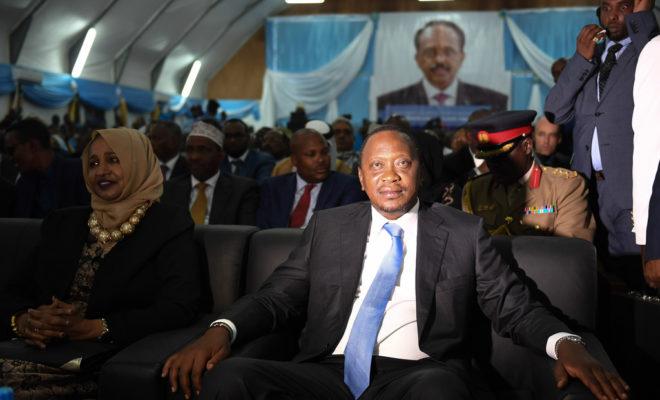Kenya’s 2017 elections will be like none before. Here’s why.

Devolution has demystified local power and emboldened voters to assert themselves, leading to shocks all the way up the political pyramid.

President Uhuru Kenyatta (pictured) and his Jubilee coalition face a strong challenge from the NASA alliance, led by Raila Odinga. Credit: AMISOM/Ilyas Ahmed.
Kenya’s 2017 elections are set to be the country’s most interesting yet. The political landscape has shifted, and whatever else these elections turn out to be – violent, peaceful, confusing − they are going to a different kettle of fish to previous polls.
The most obvious reason for this is devolution. After the 2010 constitution was passed, Kenya restructured its political and legislative units, breaking 8 massive provinces into 47 counties made up of various wards. The national legislature was broken into two branches, establishing the roles of senator and governor. And the position of women’s representatives was created in each county to help achieve the new constitution’s gender quotas.
These changes also affected how elections work. In 2007, Kenyans voted at three levels: for a councillor, a member of parliament (MP), and a president. On 8 August 2017, the electorate will vote at six: a member of the county assembly (MCA), a women’s representative, an MP, a senator, a governor, and a president.
This was also the case in 2013, but since then, it has become much clearer how the different levels of government operate in relation to one another. This means that some positions have become far more attractive and therefore competitive. And this increased contestation at the local level has undermined some of the typical tropes of Kenyan politics such as tribalism and regionalism. Things have changed.
[Why so tense? Kenya’s high stake elections explained]
[Kenya: On the hopes and limits of Boniface Mwangi’s revolution]
[How the young and restless could change Kenya’s political future]
Kenya’s political pyramid
One can think of Kenya’s system of political operatives as operating in a pyramid formation. At the bottom are local elders. One step up are county assembly members, followed by members of parliament, senators, and county governors. Above them are the ethnic kingpins. These are powerful individuals that come together to at the highest level to form national political alliances or coalitions that then contest the elections. In the case of 2017, we have President Uhuru Kenyatta and Deputy President William Ruto on one side as the incumbents, with Raila Odinga, Kalonzo Musyoka and others on the opposing side.
Typically, the role of local elders at the bottom rung has been to marshal voters to back the right kingpin at the top. Much of campaign spending goes towards cementing this local loyalty. Although politicians themselves sometimes hand out cash at rallies, the really important network has been low-level leaders giving out goodies in less intense environments. It’s the chief calling a village meeting and distributing bags of maize flour, or the women’s group leader dishing out t-shirts at the chama meeting.
In prior elections, knowing which way local leaders were leaning gave a good indication of how the overall vote in a specific region would go. For politicians, spending enough money on these low-level actors could usually guarantee a positive return at the ballot box.
Dismantling the pyramid
Not anymore it seems. Devolution has made local politics much more intimately connected with voters’ day-to-day lives. Power has become demystified, and this has inspired more people to challenge local leadership when it has been deemed to fail. A record 14,525 candidates are running for office in 2017, and low-level chiefs and elders can no longer guarantee voters’ support for a particular party through the traditional means.
In 2013, it was enough for a candidate who wanted to be elected to buy a nomination certificate from their party and then hand out money at a rally, safe in the knowledge that their “person on the ground” would distribute campaign goodies to people to secure their votes. But with a more discerning electorate who, through devolution, more closely see how local power works, or doesn’t, these tactics are no longer as effective.
This can also be seen in the way Kenyan voters have been rejecting the notion of “six-piece voting”. This was a strategy employed by national politicians in 2013 whereby they encouraged supporters to vote for the same party across all six levels of government. This was most beneficial to those candidates in the middle levels of the pyramid. Rather than establishing independent political identities, candidates for MCAs, MPs and senators could just provide money downwards to foster low-level loyalty for the party, while trading off the popularity of the national-level politicians above them.
When Odinga and Kenyatta have proposed six-piece voting in 2017, however, they have been heckled and booed at their own rallies. People don’t want to just vote blindly for the same party in all the boxes; they want more say in what happens at the various levels.
We saw these new dynamics play out in the party primaries this April. Despite significant attempts at mobilisation, voters rejected incumbent MCAs, MPs and even governors who they believe have failed to deliver. Several key allies of national politicians failed to win their party’s nomination.
Many of these figures are now running instead as independents, meaning that many ethnic groups have two or more powerful figures contesting key constituencies. This divides these ethnic kingdoms and presents a dilemma for political parties. On one hand, they need to appease loyalists by putting the force of the party behind each of their candidates; on the other, they need to court voters that support those popular independents that have left the party.
To date, leaders have responded to this conundrum by inviting some independent hopefuls to participate in party events, but this has led to public, and sometimes violent, clashes between supporters of the different candidates.
A new politics?
In 2017, voters are not just rejecting six-piece voting and exercising their judgements over local candidates beyond party loyalty. They are also being vocal and visible about it.
This is the first time in recent memory that we’re seeing national political figures appear uncertain before their own supporters during their own rallies. The sight of Kenyatta, a sitting president, being heckled – not once, but fairly consistently during the election period − is novel. That people at a Odinga rally would shout anything that wasn’t a synonym for ndio baba (“yes father”) is unprecedented.
Of course, more things have changed in Kenyan politics since 2013 than those examined here. But these changes, amongst others, have thrown a significant measure of unpredictability into the landscape. Political punditry in Kenya has always been fixated on the ethnic question, but this time around, it’s not going to be that simple. Ethnic loyalty is still important, but it is no longer absolute. Voters have changed, politicians are adapting, and everything is getting a lot more…interesting.







Let all Kenyans send Jubilee thieves home I dont understand how Uhuru can nominate Ann Waiguru who stole millions of Public Money which means they are not ready to perform but to loot as much as they can. Ruto on the other hand has built a house 1.2 billion and owing 5 helicopters. Really how much does he earn in a month? Ruto and Uhuru are both a fraud to Kenyans therefore let us vote wisely I think we need to give Nasa a chance to enable us get rid of these cartels, if Nasa manages to win and they end up not doing anything we send them home as well in 5 years. First of all Uhuru and Ruto never won the last elections which makes me sick by people enforcing themselves to rule such a beautiful country. Uhuru is a thief and a drankard while Ruto is Evil, land grabber and a big thief is there any reason why anyone should vote for them? Unless we also want to encourage them to go on stealing and destroy this country. Let us send them packing.
this politics is going to far.Why don’t you guys just understand once and forall that whoever wins with peace is a leader.
TRUE….MORE TO COME…GOOD INSIGHTS
I like that very objective, informed and informative article by Nanjala. That’s a very mature and truthful portrayal of the Kenyan political scenario at the moment and is devoid of the usual sensationalism.
Thanks Nanjala.
The problem with Kenyans, i being one, is that we believe very much on rumour and propaganda. One has no evidence only to tarnish ones reputation. God of heaven help us! This behaviour should stop and we should all focus one developing our beautiful country for future generation.
Everyone deserves to be given a chance,RAO has been rigged out several times its not fair.elections should be free and fair,If elections were not rigged in 2007 and 2013,right now there would be no tension since we would just accept the out come as before but with all these happening mara some dead persons name still in the register mara in 2013 2million Kenyans decided to vote for president only n left the other 5,i wonder when we shall have our good country back????????????????????????????